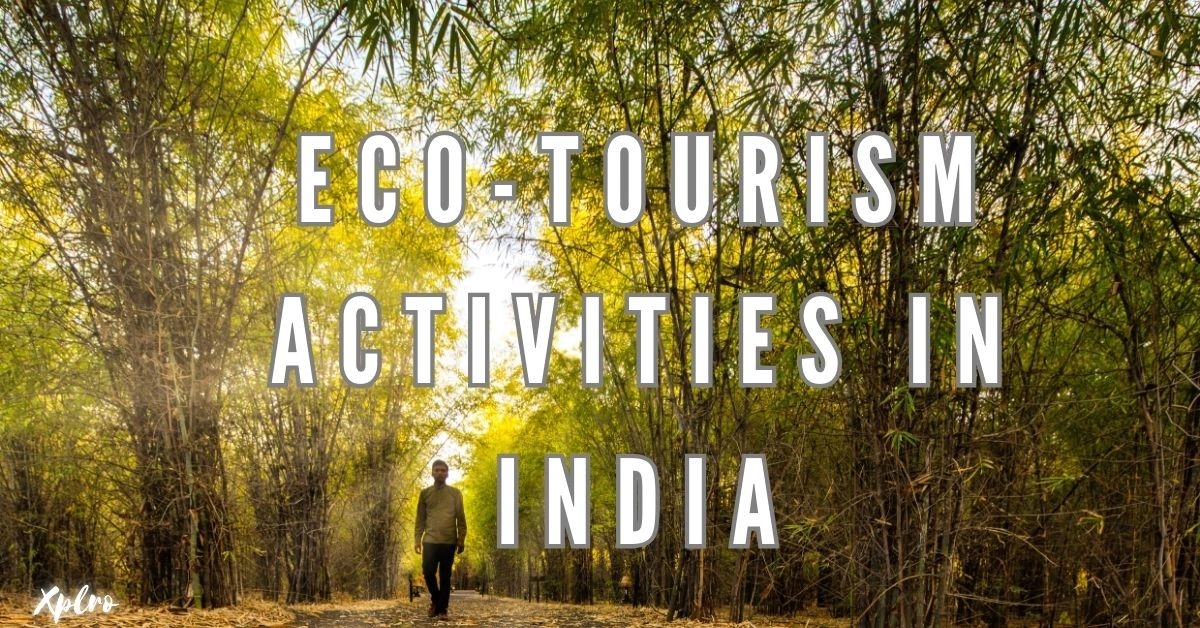Eco-Tourism Activities in India; India’s diverse landscapes and rich biodiversity make it a haven for eco-tourism enthusiasts. From lush forests and wildlife sanctuaries to sustainable agricultural practices and community-based tourism, the country offers a plethora of activities that allow travelers to experience its natural beauty while contributing to environmental conservation. Here’s a guide to the top 10 eco-tourism activities in India that combine exploration, education, and a sustainable travel philosophy.
- 1. Wildlife Safari in National Parks
- 2. Trekking in the Himalayas
- 3. Bird Watching in Wetlands
- 4. Organic Farm Tours
- 5. Houseboat Cruises in Kerala’s Backwaters
- 6. Plantation Visits and Agro-Tourism
- 7. Mangrove and Coastal Conservation Tours
- 8. Desert Safari in Rajasthan
- 9. Forest Therapy and Eco-Walks
- 10. Volunteer Programs for Conservation
- FAQs
1. Wildlife Safari in National Parks

India is home to several renowned national parks and wildlife sanctuaries that offer eco-friendly wildlife safaris. These safaris allow visitors to experience the beauty of Indian wildlife while minimizing their ecological impact.
Top Spots:
- Jim Corbett National Park: Located in Uttarakhand, Jim Corbett National Park is the oldest national park in India, famous for its tiger population.
- Ranthambore National Park: Situated in Rajasthan, Ranthambore National Park is known for its majestic tigers and ancient forts.
- Bandhavgarh National Park: Located in Madhya Pradesh, Bandhavgarh National Park is renowned for its high density of tigers.
- Kaziranga National Park: Situated in Assam, Kaziranga National Park is a UNESCO World Heritage Site famous for its one-horned rhinoceros population.
Eco-Impact: Wildlife safaris in India contribute to wildlife conservation by providing income for local communities and raising awareness about endangered species like tigers, rhinos, and elephants. By supporting these safaris, travelers can help protect India’s rich biodiversity.
2. Trekking in the Himalayas
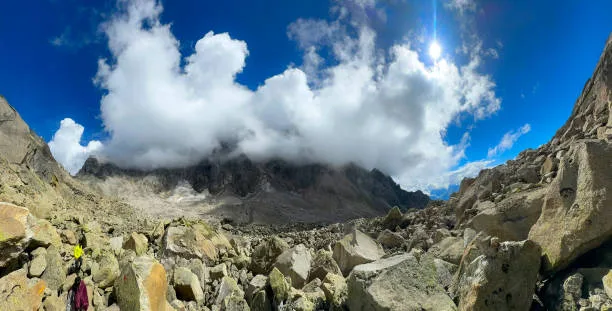
Trekking through the pristine trails of the Indian Himalayas is a rewarding eco-tourism activity. Many treks are organized with a focus on sustainability, reducing litter and encouraging eco-conscious practices.
Top Trails:
- Valley of Flowers: Located in Uttarakhand, the Valley of Flowers is a UNESCO World Heritage Site known for its vibrant wildflowers.
- Hampta Pass: Situated in Himachal Pradesh, Hampta Pass offers stunning views of the Himalayas and the Lahaul Valley.
- Markha Valley: Located in Ladakh, Markha Valley is a high-altitude trek with breathtaking landscapes and cultural experiences.
- Sandakphu: Situated in West Bengal, Sandakphu is the highest peak in the Singalila Ridge, offering panoramic views of the Himalayas.
Eco-Impact: Trekking companies in India promote sustainable tourism by employing local guides and ensuring minimal environmental impact through “leave no trace” policies. By choosing sustainable trekking options, travelers can contribute to the preservation of the Himalayas’ fragile ecosystem.
3. Bird Watching in Wetlands
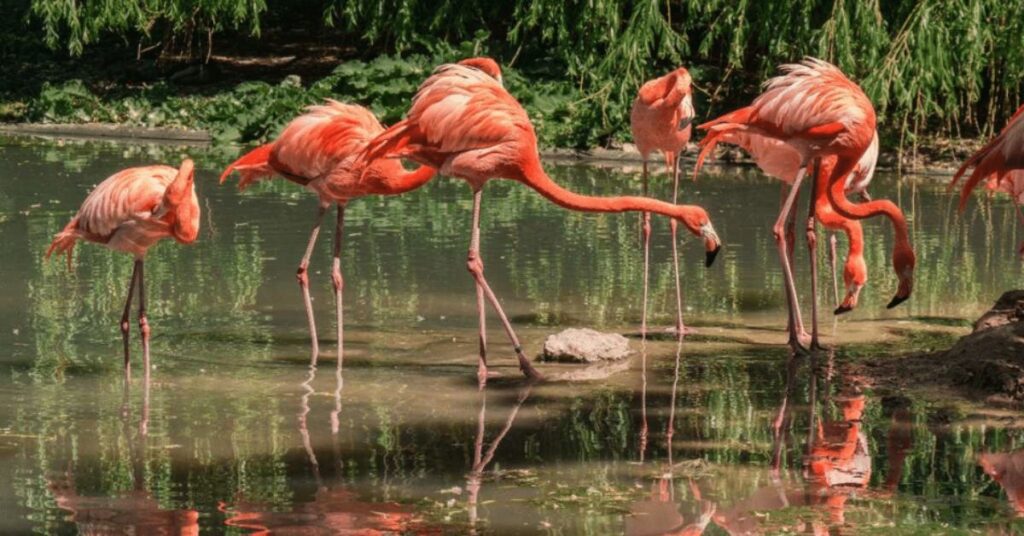
India’s wetlands and bird sanctuaries are prime locations for birdwatching, offering a haven for migratory and native bird species. This activity supports the preservation of delicate ecosystems and provides an educational experience for travelers.
Top Spots:
- Bharatpur Bird Sanctuary: Located in Rajasthan, Bharatpur Bird Sanctuary is a UNESCO World Heritage Site known for its diverse birdlife, including migratory species like Siberian cranes and pelicans.
- Chilika Lake: Situated in Odisha, Chilika Lake is the largest brackish water lagoon in Asia, attracting a wide variety of birds, including flamingos and migratory ducks.
- Kumarakom Bird Sanctuary: Located in Kerala, Kumarakom Bird Sanctuary is part of the Vembanad Lake complex, offering a peaceful retreat for birdwatchers.
- Sattal: Situated in Uttarakhand, Sattal is a cluster of seven interconnected lakes surrounded by forests, attracting a variety of bird species, including kingfishers, herons, and woodpeckers.
Eco-Impact: Birdwatching tours contribute to the protection of wetland ecosystems and emphasize the importance of conserving habitats for endangered bird species. By supporting these tours, travelers can help preserve India’s rich avian diversity.
4. Organic Farm Tours
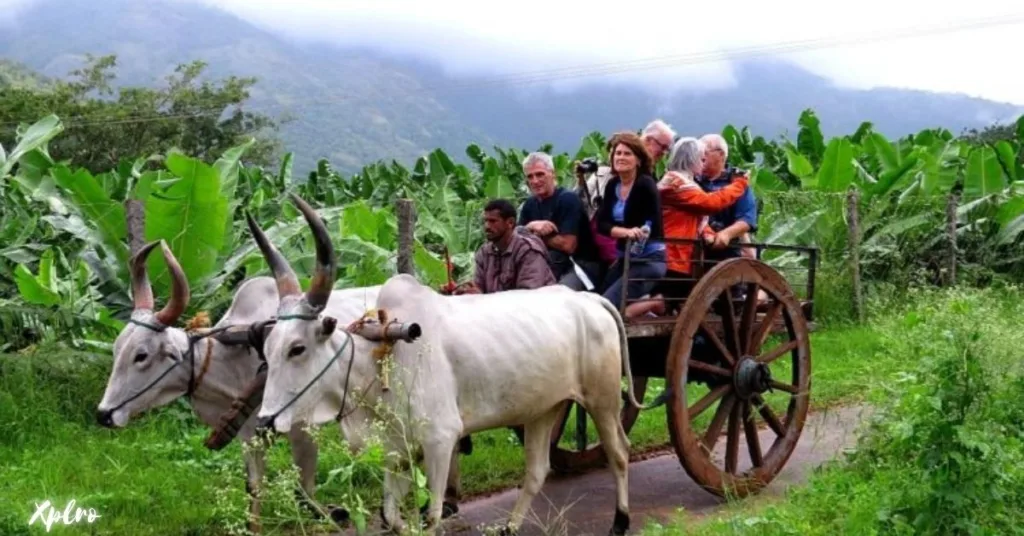
Touring organic farms in India provides travelers with a hands-on experience of sustainable agriculture practices. These tours showcase eco-friendly farming techniques that avoid chemicals and promote biodiversity.
Top Spots:
- Sikkim: India’s first fully organic state, Sikkim boasts numerous organic farms where visitors can learn about sustainable agriculture practices.
- Kerala’s Spice Farms: Kerala is famous for its spice plantations, many of which have transitioned to organic farming. Visitors can learn about the cultivation and processing of spices like cardamom, pepper, and cinnamon.
- Auroville: Located in Tamil Nadu, Auroville is an experimental township known for its sustainable living practices. Visitors can explore organic farms and learn about permaculture techniques.
Eco-Impact: Organic farms promote environmental health by eliminating chemical pesticides, encouraging biodiversity, and supporting local farmers. By supporting organic farming, travelers can contribute to a more sustainable and eco-friendly future.
5. Houseboat Cruises in Kerala’s Backwaters

Exploring the backwaters of Kerala on eco-friendly houseboats is an excellent way to experience India’s unique ecosystem. Many houseboats are designed to minimize environmental impact and use sustainable energy sources.
Top Spots:
- Alleppey: Known as the “Venice of the East,” Alleppey offers a network of interconnected canals and backwaters perfect for houseboat cruises.
- Kumarakom: Situated in Kottayam district, Kumarakom is another popular destination for houseboat cruises, offering serene backwaters and lush greenery.
- Kollam: Located in southern Kerala, Kollam offers a quieter and less touristy experience for houseboat cruises.
Eco-Impact: Houseboat operators in Kerala are increasingly adopting sustainable practices such as using solar power, water conservation methods, and promoting responsible tourism. By choosing eco-friendly houseboats, travelers can contribute to the preservation of Kerala’s fragile ecosystem.
6. Plantation Visits and Agro-Tourism
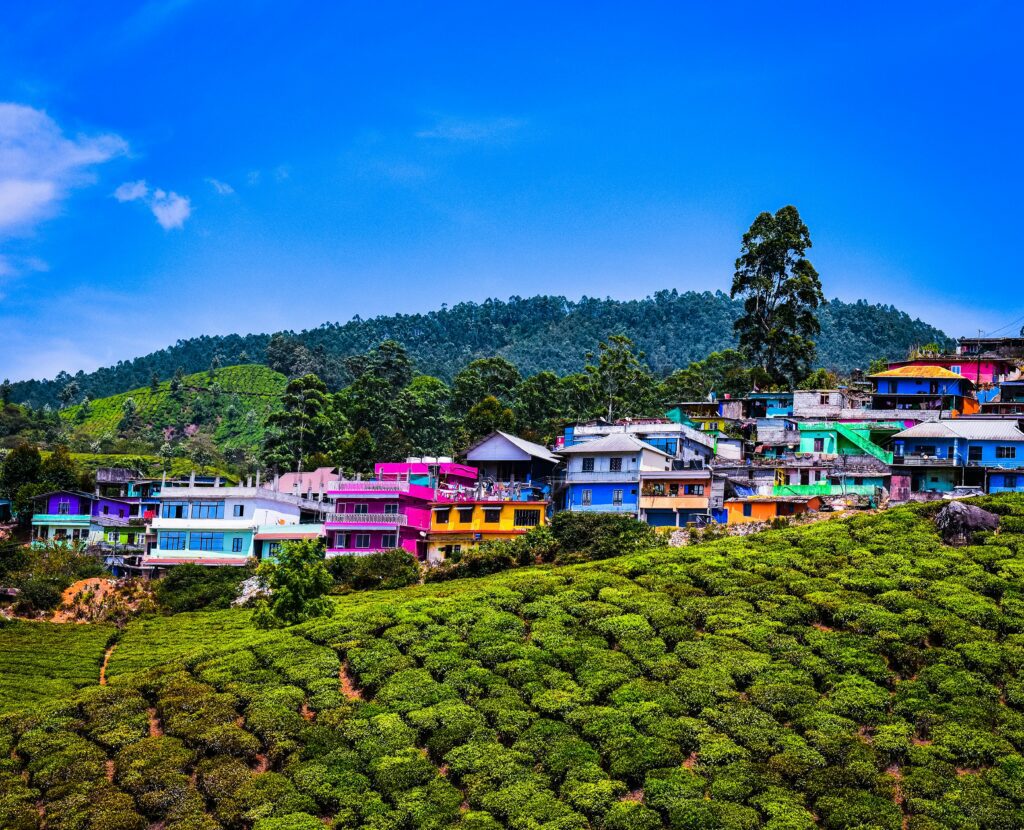
India’s tea, coffee, and spice plantations offer immersive agro-tourism experiences. Visitors can explore lush plantations, learn about sustainable farming practices, and enjoy eco-friendly accommodations.
Top Spots:
- Tea Plantations: Darjeeling in West Bengal and Munnar in Kerala are renowned for their tea plantations, offering breathtaking scenery and opportunities to learn about tea production.
- Coffee Plantations: Coorg in Karnataka is famous for its coffee plantations, where visitors can explore the lush estates and savor the aroma of freshly brewed coffee.
Eco-Impact: Agro-tourism promotes sustainable farming and provides local employment while showcasing India’s rich agricultural heritage. By supporting agro-tourism, travelers can contribute to the preservation of India’s agricultural traditions and promote sustainable practices.
7. Mangrove and Coastal Conservation Tours

Mangrove forests along India’s coastlines play a crucial role in protecting marine life and combating coastal erosion. Conservation tours allow travelers to explore these unique ecosystems while participating in efforts to preserve them.
Top Spots:
- Sundarbans Mangrove Forest: Located in West Bengal and Bangladesh, the Sundarbans is the largest mangrove forest in the world, home to the iconic Bengal tiger.
- Bhitarkanika National Park: Situated in Odisha, Bhitarkanika National Park is another significant mangrove forest, known for its diverse wildlife, including saltwater crocodiles and king cobras.
- Pichavaram Mangrove Forest: Located in Tamil Nadu, Pichavaram Mangrove Forest is a beautiful network of canals and islands, offering a serene and peaceful experience.
Eco-Impact: Mangrove conservation tours support reforestation projects and educate visitors on the importance of preserving coastal ecosystems. By participating in these tours, travelers can contribute to combating climate change, protecting biodiversity, and ensuring the health of marine ecosystems.
8. Desert Safari in Rajasthan

Eco-friendly desert safaris in Rajasthan offer a sustainable way to explore India’s vast Thar Desert while supporting local communities. Camel and jeep safaris conducted in an eco-conscious manner ensure minimal disruption to the fragile desert ecosystem.
Top Spots:
- Jaisalmer: Known as the “Golden City,” Jaisalmer is a popular destination for desert safaris, offering stunning sand dunes and ancient forts.
- Bikaner: Another popular destination for desert safaris, Bikaner is known for its camel breeding farms and royal heritage.
- Pushkar: Located in Ajmer district, Pushkar is a charming town with a serene lake and a vibrant atmosphere, offering opportunities for desert safaris and cultural exploration.
Eco-Impact: Desert safaris in Rajasthan emphasize waste reduction, responsible camping practices, and support local artisans, ensuring a sustainable livelihood for desert communities. By choosing eco-friendly safari operators, travelers can contribute to the preservation of the Thar Desert’s fragile ecosystem and support local livelihoods.
9. Forest Therapy and Eco-Walks

Forest therapy, or “Shinrin-yoku,” is gaining popularity in India as a mindful, eco-tourism activity that allows travelers to reconnect with nature. Eco-walks through protected forests offer a serene escape and promote the health benefits of spending time in natural environments.
Top Spots:
- Silent Valley National Park: Located in Kerala, Silent Valley National Park is a pristine rainforest known for its diverse flora and fauna.
- Periyar Tiger Reserve: Situated in Kerala, Periyar Tiger Reserve offers a combination of wildlife safaris and forest walks, providing a unique experience.
- Nilgiri Biosphere Reserve: Located in Tamil Nadu, Kerala, and Karnataka, Nilgiri Biosphere Reserve is a UNESCO World Heritage Site known for its diverse ecosystems and rich biodiversity.
Eco-Impact: Forest therapy tours contribute to forest conservation efforts and highlight the importance of protecting India’s natural resources. By participating in these tours, travelers can support sustainable tourism and promote the well-being of both humans and the environment.
10. Volunteer Programs for Conservation

Volunteering for conservation projects is one of the most impactful eco-tourism activities in India. Travelers can engage in various initiatives such as wildlife monitoring, tree planting, and working on community-driven eco-projects.
Top Spots:
- Rural Villages in Rajasthan: Volunteer in rural villages to support sustainable development initiatives, promote organic farming, and empower local communities.
- Wildlife Sanctuaries: Contribute to wildlife conservation efforts in national parks and wildlife sanctuaries in Uttarakhand and Madhya Pradesh, assisting with wildlife monitoring and research.
- Beach Conservation Projects: Participate in beach cleanup programs and support marine conservation efforts in Goa and other coastal regions.
Eco-Impact: Volunteer programs create lasting positive impacts on local environments, contribute to wildlife preservation, and promote sustainable community development. By volunteering, travelers can make a meaningful difference and contribute to a more sustainable future.
Final Thoughts, Eco-Tourism Activities in India
From trekking the majestic Himalayas to cruising the serene Kerala backwaters, India beckons eco-tourists with a kaleidoscope of experiences that are both enriching and sustainable. Explore national parks teeming with wildlife on an eco-friendly safari, immerse yourself in mindful forest therapy amidst pristine forests, or volunteer for conservation projects that give back to local communities. Every eco-tourism activity in India, curated on Xplro.com, your one-stop travel guide, allows you to explore the country’s natural wonders while minimizing your environmental impact. As responsible travel gains momentum, India’s flourishing eco-tourism sector caters perfectly to nature lovers and eco-conscious globetrotters seeking a meaningful connection with the incredible landscapes and diverse ecosystems of this incredible nation.
FAQs
What is eco-tourism, and how does it differ from conventional tourism?
- Eco-tourism focuses on responsible travel that minimizes environmental damage and encourages conservation. Unlike traditional tourism, eco-tourism emphasizes sustainability, benefiting local communities and protecting natural habitats, which makes Eco-Tourism Activities in India vital for preserving the country’s biodiversity.
What are the top eco-tourism destinations in India?
- Some of the best eco-tourism spots include the Kerala backwaters, the Sundarbans Mangroves, Kaziranga National Park, and tea estates in Darjeeling and Munnar. These locations are known for offering sustainable and engaging Eco-Tourism Activities in India.
What are some common eco-friendly activities available in India?
- Eco-friendly activities range from wildlife safaris in national parks, trekking in the Himalayas, bird watching in wetlands, to houseboat tours in Kerala. These are some of the popular Eco-Tourism Activities in India that allow you to experience nature while being environmentally conscious.
How do I ensure that my eco-tourism activities are sustainable?
- To make your Eco-Tourism Activities in India sustainable, choose operators that are certified in eco-tourism, reduce your waste, avoid single-use plastics, and support local businesses. Responsible behavior in sensitive ecosystems is key to sustainability.
Are eco-tourism activities family-friendly in India?
- Yes, many Eco-Tourism Activities in India are suitable for families. Activities such as nature walks, birdwatching, safaris, and organic farm tours are educational and enjoyable for all ages, making them perfect for family trips.
What are the best eco-tourism activities for adventure enthusiasts?
- Adventure lovers can indulge in trekking, river rafting, and desert safaris that are conducted in an eco-conscious way. These exciting Eco-Tourism Activities in India cater to adventure seekers while promoting sustainable practices.
How does eco-tourism help wildlife conservation in India?
- Eco-tourism plays a key role in conserving wildlife by educating visitors about endangered species and their habitats. It supports conservation programs, generates revenue for park management, and highlights the importance of protecting ecosystems through sustainable Eco-Tourism Activities in India.
Are there volunteer opportunities in eco-tourism in India?
- Yes, you can find volunteer programs that allow you to contribute to conservation efforts. Activities like wildlife monitoring, tree planting, and community outreach are some ways to engage in meaningful Eco-Tourism Activities in India.
Which regions in India offer eco-friendly trekking routes?
- Eco-friendly trekking routes are available in the Valley of Flowers in Uttarakhand, Hampta Pass in Himachal Pradesh, and Sandakphu in West Bengal. These treks are part of the larger array of Eco-Tourism Activities in India, promoting sustainability by reducing waste and employing local guides.
Are eco-tourism activities in India affordable?
- Yes, many Eco-Tourism Activities in India are budget-friendly, such as trekking, birdwatching, and nature tours. There are also luxury eco-lodges and houseboat experiences for travelers seeking more comfort while staying environmentally conscious.
What role do local communities play in eco-tourism in India?
- Local communities are integral to eco-tourism, as many initiatives directly involve them. By participating in Eco-Tourism Activities in India, you support the local economy, cultural preservation, and environmental conservation efforts led by indigenous groups.
How can I find eco-friendly accommodations in India?
- Many eco-friendly accommodations in India are available, especially near popular eco-tourism destinations. Look for certifications like Green Globe or Eco Hotels, which ensure that your stay aligns with sustainable Eco-Tourism Activities in India, promoting environmental responsibility through energy-efficient systems and organic food sourcing.




